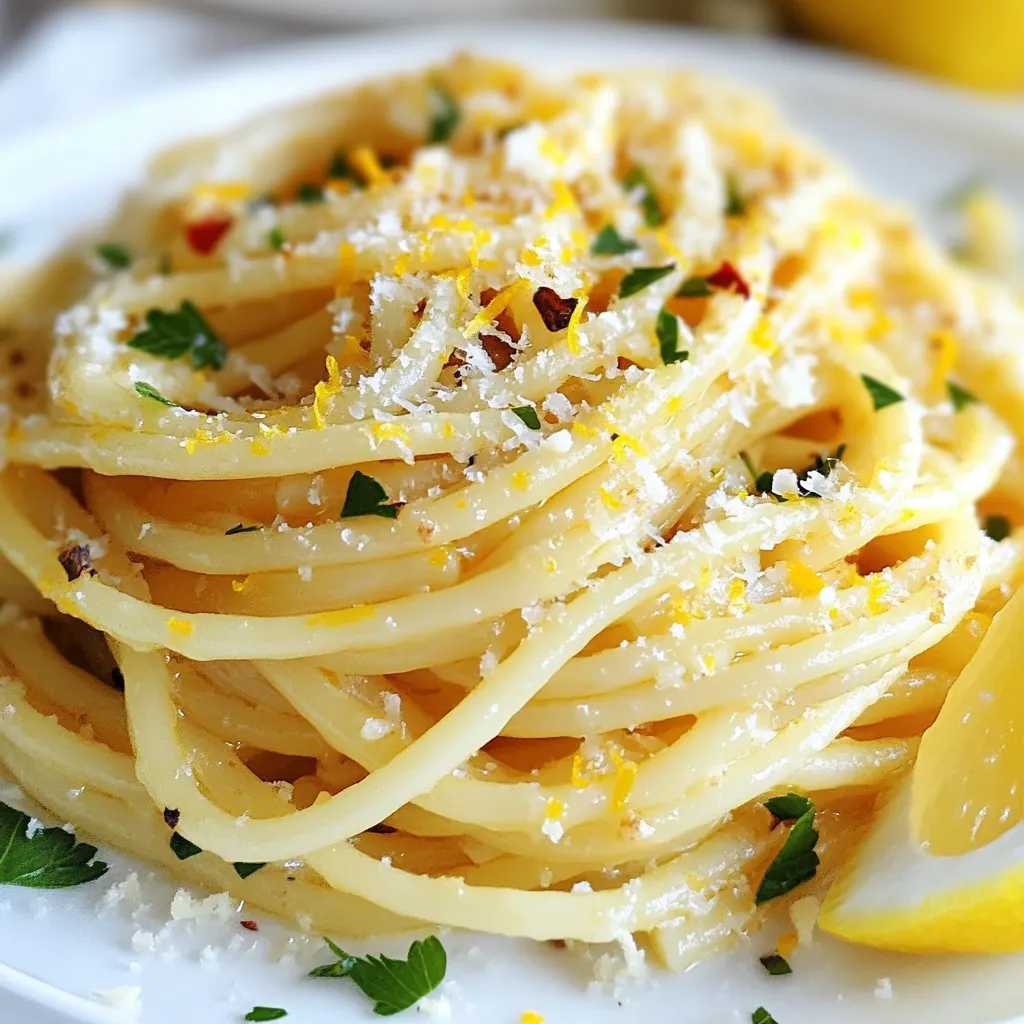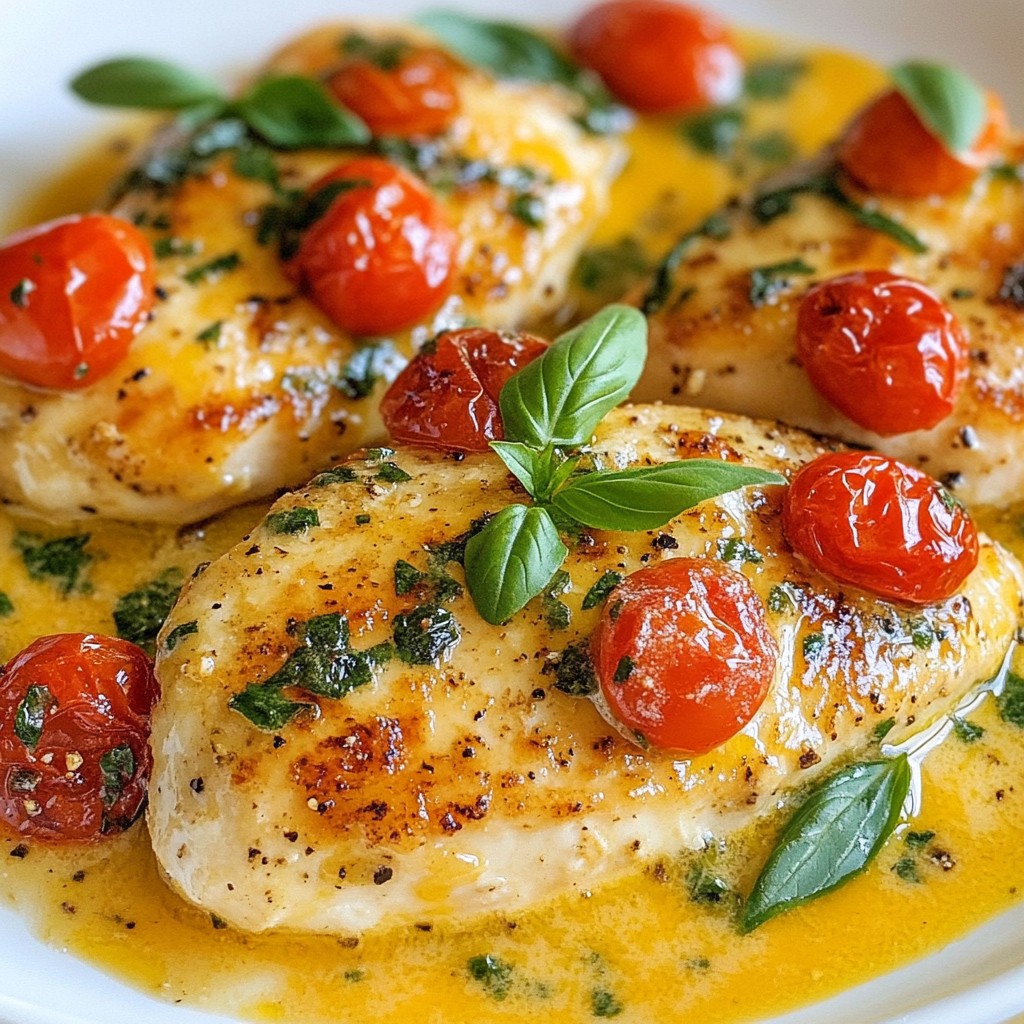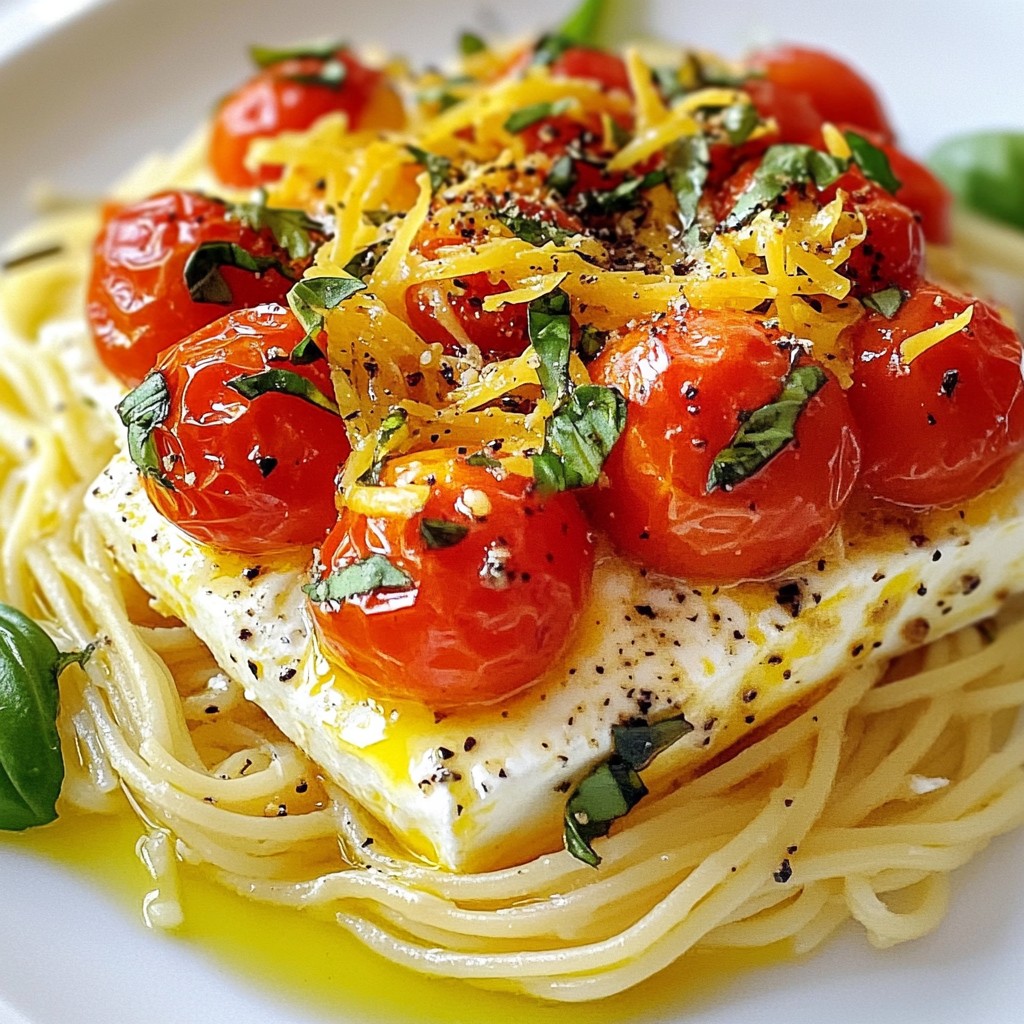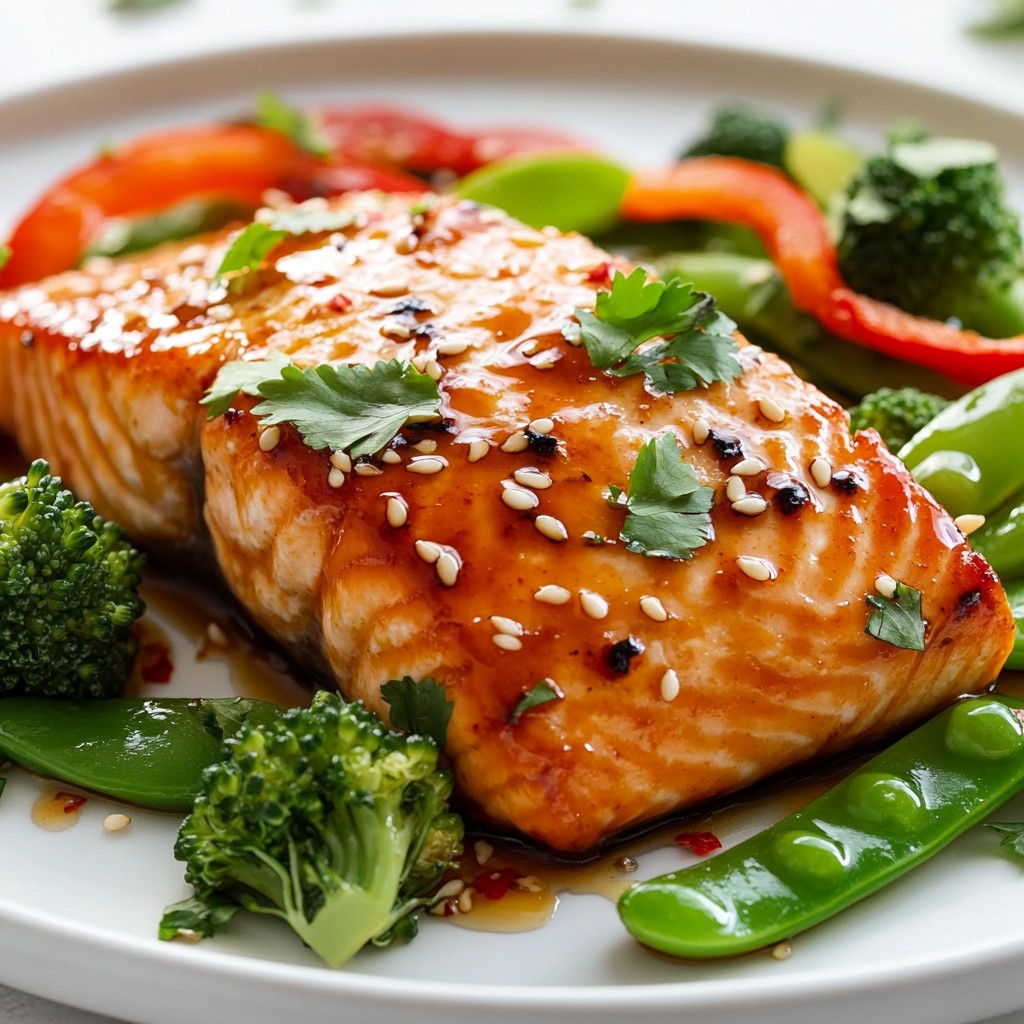Looking for a quick and tasty dinner? Garlic butter pasta packs tons of flavor and is super easy to make. With just a few simple ingredients like spaghetti, garlic, and butter, you can whip up this delightful dish in no time. Let’s dive into how to create a meal that will impress your friends and family while keeping your kitchen stress-free!
Why I Love This Recipe
- Simple and Quick: This recipe is perfect for busy weeknights, taking only 20 minutes from start to finish.
- Flavor Explosion: The combination of garlic, butter, and lemon creates a rich and zesty flavor that elevates the pasta.
- Customizable: You can adjust the spice level with red pepper flakes and add your favorite proteins or veggies.
- Fresh Ingredients: Using fresh parsley and lemon zest adds a wonderful brightness to the dish, making it feel gourmet.
Ingredients
To make garlic butter pasta, you need the best ingredients. Here’s what you will gather:
– 8 oz spaghetti or linguine
– 6 tablespoons unsalted butter
– 5 cloves garlic, minced
– 1 teaspoon red pepper flakes (adjust to taste)
– 1/2 cup grated Parmesan cheese
– 1/4 cup fresh parsley, chopped
– Salt and black pepper to taste
– Zest of 1 lemon
– Juice of 1/2 lemon
These ingredients create a simple yet flavorful dish. The spaghetti or linguine serves as the perfect base. The unsalted butter adds a rich taste. Minced garlic brings a bold aroma. Red pepper flakes add a hint of spice, making it exciting.
Grated Parmesan cheese gives the dish a creamy texture. Fresh parsley adds a pop of color and freshness. Salt and black pepper enhance all the flavors. Lemon zest and juice brighten up the dish, creating a balance.
With these ingredients, you can make a meal that impresses. They work in harmony to create garlic butter pasta, a dish you’ll love!
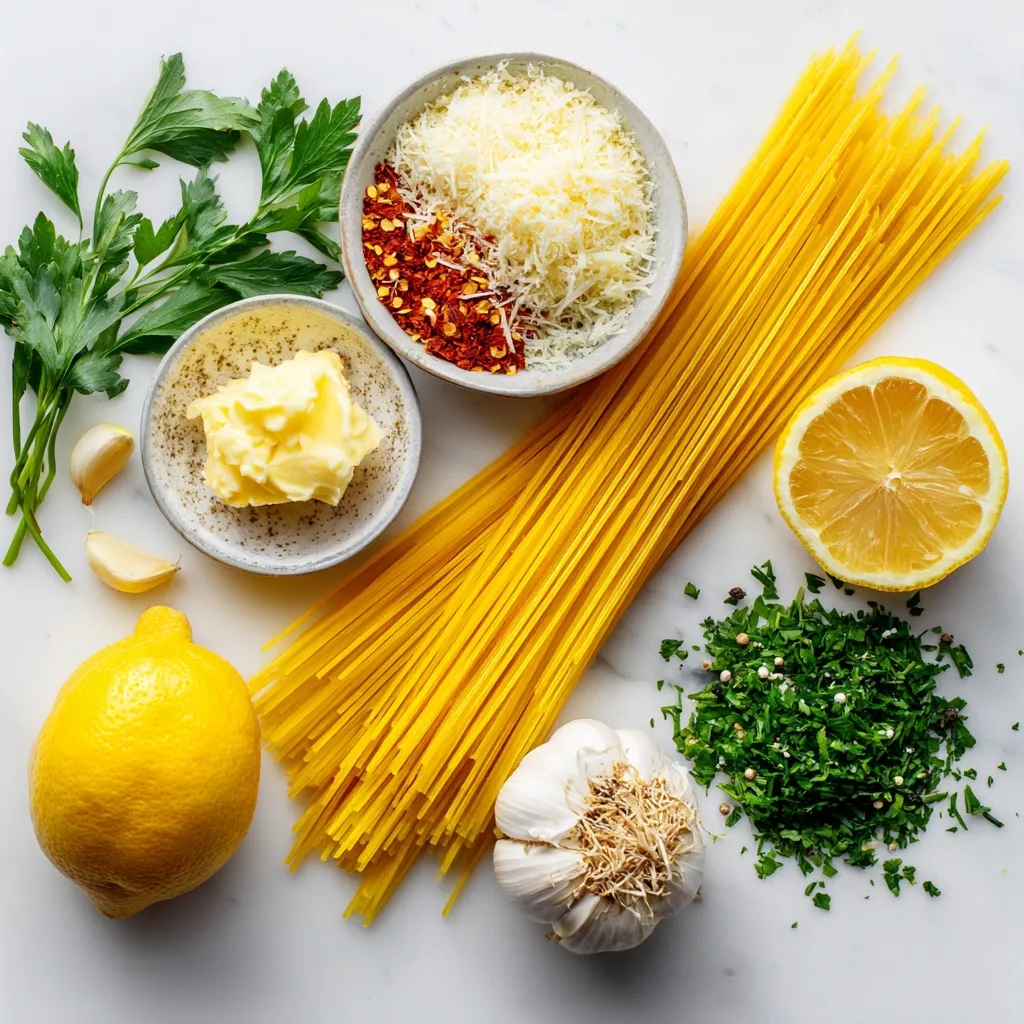
Step-by-Step Instructions
Cooking the Pasta
1. Boiling salted water: Start by filling a large pot with water. Add a good amount of salt to the water. This helps flavor the pasta as it cooks. Bring the water to a boil over high heat.
2. Cooking to al dente: Once the water boils, add 8 oz of spaghetti or linguine. Stir it gently to keep it from sticking. Cook according to the package instructions, usually around 8-10 minutes. You want it to be al dente, which means it should be firm but not hard.
3. Reserving pasta water: Before draining the pasta, scoop out 1 cup of the pasta water. This starchy water will help the sauce stick later. Drain the pasta in a colander and set it aside.
Preparing the Garlic Butter
1. Melting the butter: In the same pot or a large skillet, melt 6 tablespoons of unsalted butter over medium heat. This butter will add richness to your dish.
2. Sautéing garlic and red pepper: Add 5 cloves of minced garlic and 1 teaspoon of red pepper flakes to the melted butter. Stir it for 1-2 minutes until the garlic smells great and turns golden. Be careful not to burn the garlic!
Combining Pasta and Sauce
1. Tossing pasta with garlic butter: Add your drained pasta to the skillet with the garlic butter. Toss it well to coat all the pasta in that tasty butter.
2. Adjusting consistency with pasta water: If the pasta looks too dry, slowly add some of the reserved pasta water. Mix it in until the pasta is creamy and well-coated.
Finishing Touches
1. Adding cheese, lemon zest, and juice: Sprinkle in 1/2 cup of grated Parmesan cheese, the zest of 1 lemon, and the juice of 1/2 lemon. Toss everything together until combined.
2. Seasoning to taste: Taste your pasta. Add salt and black pepper as needed for extra flavor.
Serving the Dish
1. Garnishing tips: Before serving, stir in 1/4 cup of fresh chopped parsley for a bright touch.
2. Presentation suggestions: Serve the pasta in warm bowls. Top with more Parmesan cheese and a sprinkle of parsley. A lemon wedge on the side adds a nice touch for those who enjoy a citrusy bite.
Tips & Tricks
Cooking Tips
– Ensuring perfect al dente pasta: Always use a large pot with plenty of water. This helps the pasta cook evenly. Check the pasta package for cooking time. Taste it a minute before the time is up. It should be firm but not hard.
– Avoiding burnt garlic: Cook garlic on medium heat. Keep an eye on it. Once it turns golden, take it off the heat. Burnt garlic tastes bitter and ruins the dish.
Flavor Enhancement Suggestions
– Experimenting with additional spices: Try adding herbs like basil or oregano. A pinch of smoked paprika can also give a nice kick. Mix and match spices to find your favorite flavor.
– Using different cheese types: Parmesan is great, but don’t stop there! Try Pecorino Romano for a sharper taste. A bit of feta can add a creamy texture too.
Making Ahead
– Prepping ingredients in advance: Chop garlic and parsley ahead of time. You can even cook the pasta earlier in the day. Just toss it in a bit of oil to keep it from sticking.
– Storing leftovers properly: Place leftover pasta in an airtight container. It lasts in the fridge for about three days. To reheat, add a splash of water and warm it slowly. This keeps it moist and tasty.
Pro Tips
- Tip for Perfect Pasta: Always salt your pasta water well; it should taste like the sea. This is essential for flavoring the pasta itself.
- Tip for Garlic: Be careful not to burn the garlic when sautéing. It should be lightly golden and fragrant for the best flavor.
- Tip for Creaminess: If you want an extra creamy sauce, add more reserved pasta water gradually until you reach your desired consistency.
- Tip for Freshness: Adding fresh herbs like parsley at the end of cooking preserves their bright flavor and color, enhancing the dish’s overall appeal.
Variations
Protein Additions
Incorporating Chicken
Adding chicken to garlic butter pasta brings a hearty touch. You can use grilled or pan-seared chicken breast. Slice the chicken into strips. Toss it in with the pasta and garlic butter. This adds protein and makes the dish more filling.
Adding Shrimp
Shrimp adds a nice seafood flavor. Start by sautéing shrimp in the garlic butter before adding the pasta. Cook until the shrimp turns pink. This only takes a few minutes. The shrimp pairs well with the garlic and lemon, making it a favorite.
Vegetarian Options
Using Zucchini or Spinach
For a veggie boost, add zucchini or spinach. You can spiralize zucchini into noodles. This creates a fresh base for your dish. If using spinach, toss it in just before serving. It wilts quickly and adds color.
Creating a Creamy Version
To make a creamy garlic butter pasta, add heavy cream. Mix it in with the garlic butter before tossing with the pasta. This creates a rich sauce. You can also add cream cheese for extra creaminess. This variation is perfect for those who love rich flavors.
Gluten-Free Alternatives
Using Zucchini Noodles
Zucchini noodles are a great gluten-free option. They are low in carbs and very healthy. Use a spiralizer to make them. Cook them briefly in the garlic butter. This keeps them tender yet crisp.
Exploring Gluten-Free Pasta Options
You can also find gluten-free pasta made from rice or lentils. These options cook just like regular pasta. Follow the package instructions for best results. They hold the garlic butter sauce well, making a delightful dish.
Storage Info
Refrigeration Guidelines
After you finish your garlic butter pasta, let it cool. Store leftovers in an airtight container. This keeps the pasta fresh. If you use glass or plastic containers, make sure they seal well. You can keep it in the fridge for about 3 to 4 days.
Freezing Garlic Butter Pasta
To freeze your pasta, let it cool completely. Transfer it to freezer bags or containers. Remove as much air as you can before sealing. This helps avoid freezer burn. When you’re ready to eat, thaw it overnight in the fridge. Reheat in a pan over low heat, adding a splash of water or broth to keep it moist.
Shelf Life
Garlic butter pasta lasts about 3 to 4 days in the fridge. Check for signs of spoilage before eating. If it smells sour or looks slimy, it’s best to throw it away. Always trust your senses to keep your meals safe.
FAQs
What is the best pasta for garlic butter sauce?
The best pasta for garlic butter sauce is spaghetti or linguine. Both types hold the sauce well. Their long strands catch the garlic butter, making each bite tasty. If you prefer a different shape, you can try fettuccine or even penne. Choose what you love most!
Can I make garlic butter pasta without cheese?
Yes, you can make garlic butter pasta without cheese. Leave out the Parmesan to keep it dairy-free. The dish will still taste great with just garlic, butter, and lemon. If you want a different flavor, try adding nuts like pine nuts or walnuts for a crunchy twist.
How can I make garlic butter pasta spicier?
To make garlic butter pasta spicier, add more red pepper flakes. Start with a teaspoon and taste as you go. You can also include chopped fresh chili or even hot sauce. Adjust the spice to your liking for the perfect kick!
What goes well with garlic butter pasta as a side dish?
Many sides pair well with garlic butter pasta. A fresh green salad adds crunch and balance. Garlic bread or crusty bread is great for mopping up sauce. Roasted or sautéed vegetables, like broccoli or asparagus, can also enhance your meal.
Can I add vegetables to this dish?
Absolutely! Adding vegetables is a great way to boost nutrition. You can toss in spinach, cherry tomatoes, or zucchini. Saute them with the garlic for added flavor. This makes the dish colorful and even more delicious!
This blog post highlighted simple ingredients and easy steps for making garlic butter pasta. You learned how to cook pasta, prepare the sauce, and serve it with flair. I shared tips to enhance flavors and variations for different diets. With storage advice, your leftovers will stay fresh. Remember, garlic butter pasta is versatile and fun to make. I hope you feel inspired to create your own delicious dishes. Enjoy experimenting with this recip
